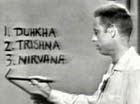 |
| 1. Disappointment, 2. Craving, 3. Freedom -- a clean cut Alan Watts on American TV |
 |
| Mystical Watts in 60s California |
Pacifica Berkeley's beloved history buff Mitch Jeserich finally went overtly Buddhist coordinating an entire show about the late great British-born Zen, Taoist, Eastern Philosophy master Alan Watts. It was the first day of the fund drive, and he would be following up the next day (today) with an all meditation show featuring salesman George Quant and his post-TM "IQM." The wonders of meditation were extolled but slightly sullied by Quant's crass salesmanship. It was like listening to a motivational speaker wing it on stage while thinking that nobody is noticing all the speech errors and redundancies, the misused terminology and overreaching to sound scientifical. At least he has the background for it (with TM and Deepak Chopra Foundation credentials and what he learned in one day at UCLA), and goodness knows selling mantras as a panacea has been in vogue since the 1970s. Just think of that funny scene in Woody Allen's "Annie Hall" at the California party. But sales are sales, and it is a fund drive. And if it helps Jeserich meditate more, then it was all for aught.
- PLAY NOW! (Oct. 9, 2013, 10:00 am, download MP3 clip, 10.28 MB)
Who cares about Watts (RIP)?
Dhr. Seven, Amber Larson, CC Liu, Wisdom Quarterly
 |
| The Buddha initiated a missionary movement |
It all started in Berkeley, but Alan Watts changed our lives in Los Angeles. KPFK FM remains the only Pacifica Radio station to regularly schedule segments of Watts from the archives. Thanks are due to Roy (of Hollywood) Tuckman, whose Sunday morning show (8:00 am) and overnight ("Something's Happening," 12:00 am-5:00 am) Thursday broadcasts keep Watts alive in our ears and minds.
Watts was perhaps the first Westerner in America to really understand Zen, the way of the Tao, Asian culture, and Mahayana Buddhism more generally. He, of course, had help from the early Occidentals, those British, German, and French scholars of the Pali Text Society and their Wisdom of the East (Orientalist) translations and interpretations.
What we have today by way of accurate accounts of the historical Buddha's words and teachings in English owe much more to the work of these European pioneers than that of the ordained monastics in Asia whose missionary efforts tried to carry the message across the sea in the tradition of the Buddha's earliest disciples.
It was the Buddha who began to set in motion the Wheel of the Dharma by teaching five hearers then sending out 60 enlightened disciples, no two in the same direction, to spread the news that enlightenment was possible for ordinary householders regardless of caste, socioeconomic status, gender, race, or other social barriers.
Those Buddhist missionaries apparently succeeded far outside of India to the west even before the Dharma spread east to the shores of Vietnam (Indochina) on the South China Sea. They (and their own followers) traveled from modern day Afghanistan and Iran (Baluchistan) up through Central Asia and, centuries later, through the future Indo-Greco empires of Bactria and Sogdia, into Israel (cosmopolitan Jerusalem) and Europe (Kalmykia), Mongolia, Russia, Siberia, and China. The message even seems to have reached Catholic Rome through the Church Father Origen.
Jesus the Buddhist
 |
| A wild eyed householder Watts who drank |
Saint Issa (Jesus of Nazareth) apparently heard something that called his attention to travel to India/Ladakh/Tibet in search of truth and a mission of his own. (But few Christians will stand for that story being widely told; fortunately, Holger Kersten, Elmar Gruber, the BBC, and others do tell it widely.
Few would believe that Buddhism was in an arm of ancient Greece (the "West") before it made it to China. Fewer would believe that the Buddha's teachings first came to the Americas from China a thousand years ago. But that incredible journey is documented in Rick Field's How the Swans Came to the Lake. Of course, truth has always been stranger than fiction. And now as then the world get the universal Dharma from all directions. Do we understand it? Alan Watts did.

No comments:
Post a Comment